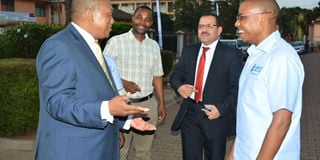Envoy calls for labour exchange

L-R: South African ambassador Mollo Solly Lekao shares a light moment with Mr Andrew Ssekitoleko, the executive director of Rubaga hospital, Mr Hatem M Abdelakher, the managing director of Eye World Clinic, and Mr Ahmed Kalebi, the managing director of Lancet East Africa, at Lancet’s laboratory headquarters in Kampala at the weekend. PHOTO BY GODFREY LUGAAJU
What you need to know:
- It will help open up their minds into knowing that what they do is first; a calling before the issue of money comes in - Mr Lekao Solly Mollo
- Mr Solly was responding to the on-going strike by the doctors in the country.
- The strike will only end if the government resolves issues of duty facilitation allowances, fixes intern doctors’ working conditions and welfare as well as payments for senior house officers - Dr Ekwaru Obuku .
Kampala. The South African High Commissioner to Uganda, Mr Lekao Solly Mollo, has said the only way to reduce strikes in the public sector is to encourage exchange of professionals among countries.
Speaking at the fourth anniversary of Lancet Laboratories Uganda Limited, Mr Solly said strikes have become rampant among African countries, but they can only end if there is mobility of labour as it will bring exposure and expertise.
“When we start exchanging doctors and other professions, it will help open up their minds into knowing that what they do is first; a calling before the issue of money comes in. We also understand the issues that come with low pay and remunerations,” he said.
Mr Solly was responding to the ongoing strike by the doctors in the country.
It is now a week since doctors laid down their tools in protest of low pay, among other grievances.
The president of Uganda Medical Association (UMA), Dr Ekwaru Obuku, said the strike could only end if the government resolves issues of duty facilitation allowances, fixes intern doctors’ working conditions and welfare as well as payments for senior house officers.
Despite the government ordering the doctors to return to work, the strike has persisted.
Mr Robert Lukando, the country director of Lancet, said the strike affects both the private and public sectors.
“We need the government to come out clearly on this issue,” he said.
Mr Lekao Solly Mollo also encouraged African pathologists to think of a lasting solution to high mortality rate in Africa.
A report from the African Leadership for Child Survival shows that Sub-Saharan Africa has the highest risk of death in the first month of life and is among the regions showing the least progress.
In Eastern and Southern Africa the decline was from 162 in 1990 to 84 in 2011.In West and Central Africa the decline was from 197 in 1990 to 132 in 2011.Eastern and Southern Africa have reduced under-five deaths by 48% from 1990 to 2011. Western and Central Africa have reduced under-five deaths by 33% from 1990 to 2011.
Liberia, Rwanda, Malawi, and Madagascar are among the top ten countries with the
Greatest percentage decline in their under-five mortality ratesfrom1990 2011The under five mortality rates decreased in these countries by 67.5%, 65.4%, 63.6%, and 61.8% respectively.




